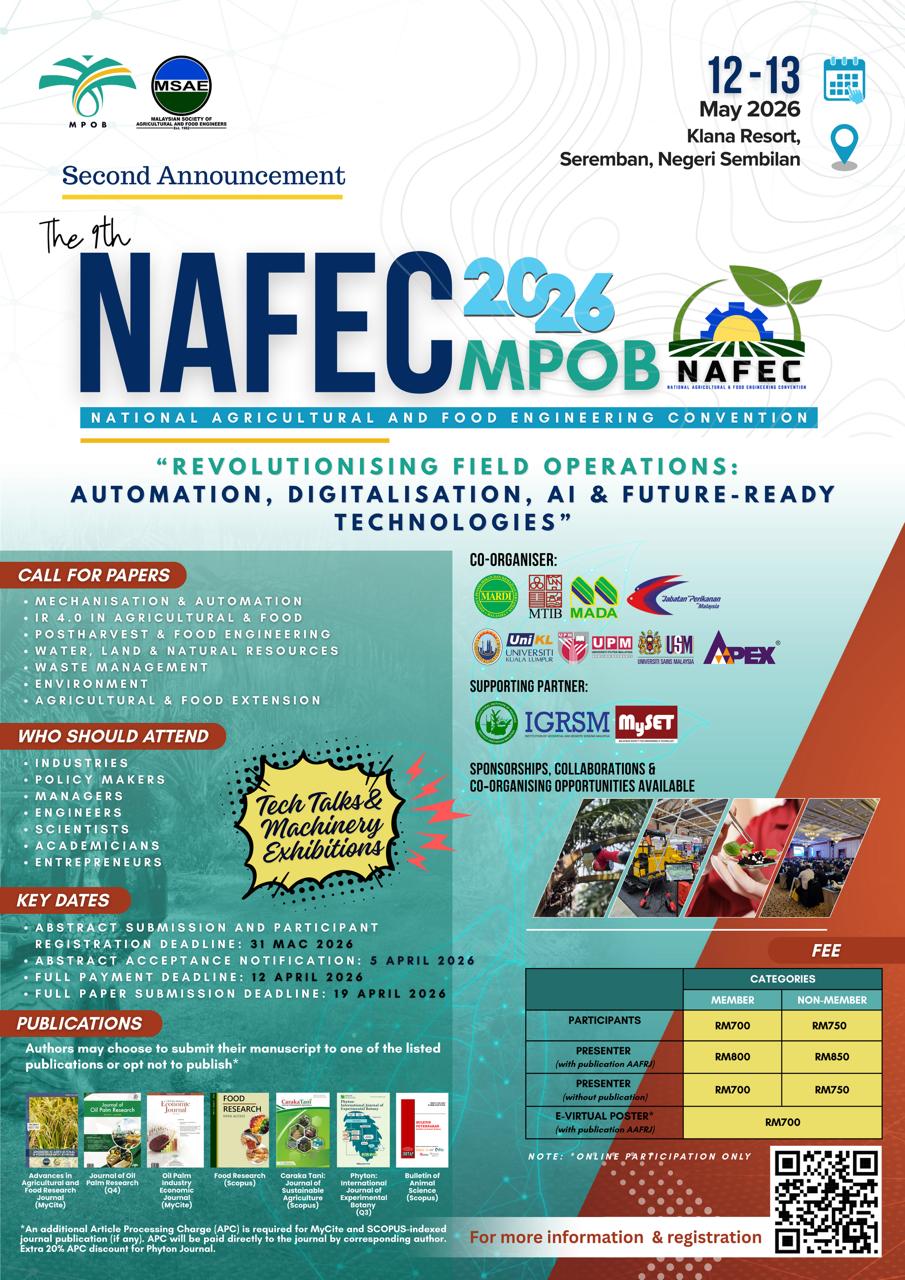Computational Studies on the Effects of a Central Shaft and a Guiding Wall on the Savonius Hydrokinetic Turbine Performances
DOI:
https://doi.org/10.36877/aafrj.a0000253Abstract
Most wetland rice production schemes have good networks of irrigation and drainage canals built for the benefit of the farmers to perform farming activities. The canals have ample volume of running water all year round and could be harnessed for hydropower. The Savonius hydrokinetic turbine has been generally used to generate electrical energy as the means of renewable source over fossil fuels. Numerous parameters have been studied to enhance the performance of the turbine. However, the turbine power performance is still low as compared to other types even though it is known to have excellent torque characteristics. Therefore, the objectives of this study are to evaluate the effects of a central shaft and a guiding wall on the performances of the Savonius hydrokinetic turbines by using two-dimensional computational simulations. ANSYS Fluent software with the standard k-ε turbulence model and dynamic mesh motion techniques were used to get the optimum central shaft and guiding wall configurations. The central shaft was studied in three cases; (I) with a full shaft, (II) with a shaft and space, and (III) without shaft between two end plates. Moreover, the turbine performances were also evaluated with and without the presence of a guiding wall. The turbine performances were computed. Simulation results e.g. velocity, pressure contours and flow structures across a SHKT model were analysed and discussed.
References
Akwa, J. V., Vielmo, H. A., & Petry, A. P. (2012). A review on the performance of Savonius wind turbines. Renewable and Sustainable Energy Reviews, 16(5), 3054–3064. https://doi.org/10.1016/J.RSER.2012.02.056
El-Askary, W. A., Nasef, M. H., AbdEL-hamid, A. A., & Gad, H. E. (2015). Harvesting wind energy for improving performance of Savonius rotor. Journal of Wind Engineering and Industrial Aerodynamics, 139, 8–15. https://doi.org/10.1016/J.JWEIA.2015.01.003
Golecha, K., Eldho, T. I., & Prabhu, S. V. (2011). Influence of the deflector plate on the performance of modified Savonius water turbine. Applied Energy, 88(9), 3207–3217. https://doi.org/10.1016/J.APENERGY.2011.03.025
Kailash, G., Eldho, T. I., & Prabhu, S. V. (2012). Performance study of modified savonius water turbine with two deflector plates. International Journal of Rotating Machinery, 2012. https://doi.org/10.1155/2012/679247
Kamoji, M. A., Kedare, S. B., & Prabhu, S. V. (2009a). Experimental investigations on single stage modified Savonius rotor. Applied Energy, 86(7–8), 1064–1073. https://doi.org/10.1016/J.APENERGY.2008.09.019
Kamoji, M. A., Kedare, S. B., & Prabhu, S. V. (2009b). Performance tests on helical Savonius rotors. Renewable Energy, 34(3), 521–529. https://doi.org/10.1016/J.RENENE.2008.06.002
Kerikous, E., & Thévenin, D. (2019). Optimal shape and position of a thick deflector plate in front of a hydraulic Savonius turbine. Energy, 189, 116157. https://doi.org/10.1016/J.ENERGY.2019.116157
Kianifar, A., & Anbarsooz, M. (2011). Blade curve influences on the performance of Savonius rotors: Experimental and numerical. Proceedings of the Institution of Mechanical Engineers, Part A: Journal of Power and Energy, 225(3), 343–350. https://doi.org/10.1177/2041296710394413
Kumar, A., & Saini, R. P. (2016). Performance parameters of Savonius type hydrokinetic turbine – A Review. Renewable and Sustainable Energy Reviews, 64, 289–310. https://doi.org/10.1016/J.RSER.2016.06.005
Mabrouki, I., Driss, Z., & Abid, M. S. (2014). Performance Analysis of a Water Savonius Rotor: Effect of the Internal Overlap. Sustainable Energy, 2(4), 121–125. https://doi.org/10.12691/rse-2-4-1
Mahmoud, N. H., El-Haroun, A. A., Wahba, E., & Nasef, M. H. (2012). An experimental study on improvement of Savonius rotor performance. Alexandria Engineering Journal, 51(1), 19–25. https://doi.org/10.1016/J.AEJ.2012.07.003
Menet, J.-L. J., Bourabaa, N., & Bouraba, N. (2004). Increase in the Savonius rotors efficiency via a parametric investigation. EWEA - 2004 European Wind Energy Conference. Retrieved from http://www.wrapwind.com/download/vawt/23_1400_jeanlucmenet_01.pdf
Mohamed, M. H., Janiga, G., Pap, E., & Thévenin, D. (2010). Optimization of Savonius turbines using an obstacle shielding the returning blade. Renewable Energy, 35(11), 2618–2626. https://doi.org/10.1016/J.RENENE.2010.04.007
Roy, S., & Saha, U. K. (2013a). Computational Study to Assess the Influence of Overlap Ratio on Static Torque Characteristics of a Vertical Axis Wind Turbine. Procedia Engineering, 51, 694–702. https://doi.org/10.1016/J.PROENG.2013.01.099
Roy, S., & Saha, U. K. (2013b). Review on the numerical investigations into the design and development of Savonius wind rotors, Renewable and Sustainable Energy Reviews,24, 73–83.
Sarma, N. K., Biswas, A., & Misra, R. D. (2014). Experimental and computational evaluation of Savonius hydrokinetic turbine for low velocity condition with comparison to Savonius wind turbine at the same input power. Energy Conversion and Management, 83, 88–98. https://doi.org/10.1016/J.ENCONMAN.2014.03.070
Talukdar, P. K., Sardar, A., Kulkarni, V., & Saha, U. K. (2018). Parametric analysis of model Savonius hydrokinetic turbines through experimental and computational investigations. Energy Conversion and Management, 158(October 2017), 36–49.
Yaakob, O. Bin, Tawi, K. B., & Sunanto, D. T. S. (2010). Computer simulation studies on the effect overlap ratio for savonius type vertical axis marine current turbine. International Journal of Engineering, Transactions A: Basics, 23(1), 79–88.
Zhao, Z., Zheng, Y., Xu, X., Liu, W., & Hu, G. (2009). Research on the improvement of the performance of savonius rotor based on numerical study. 1st International Conference on Sustainable Power Generation and Supply, SUPERGEN ’09, 1–6. https://doi.org/10.1109/SUPERGEN.2009.5348197
Downloads
Published
How to Cite
Issue
Section
License
Copyright (c) 2021 Komsan Tantichukiad, Azmi Yahya, Anas Mohd Mustafah, Hazreen Haizi Harith, Azmin Shakrine Mohd Rafie, Ahmad Suhaizi Mat Su

This work is licensed under a Creative Commons Attribution-NonCommercial 4.0 International License.
Author(s) shall retain the copyright of their work and grant the Journal/Publisher right for the first publication with the work simultaneously licensed under:
Creative Commons Attribution-NonCommercial 4.0 International (CC BY-NC 4.0). This license allows for the copying, distribution and transmission of the work, provided the correct attribution of the original creator is stated. Adaptation and remixing are also permitted.

This broad license intends to facilitate free access to, as well as the unrestricted reuse of, original works of all types for non-commercial purposes.
The author(s) permits HH Publisher to publish this article that has not been submitted elsewhere.
.png)

.jpg)



